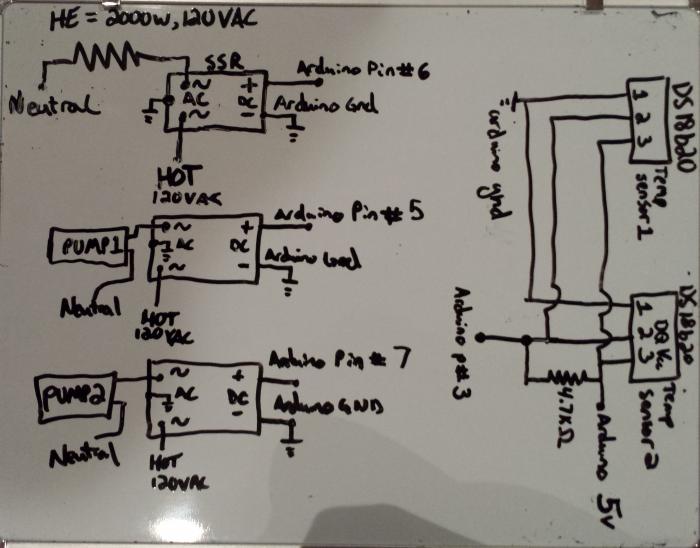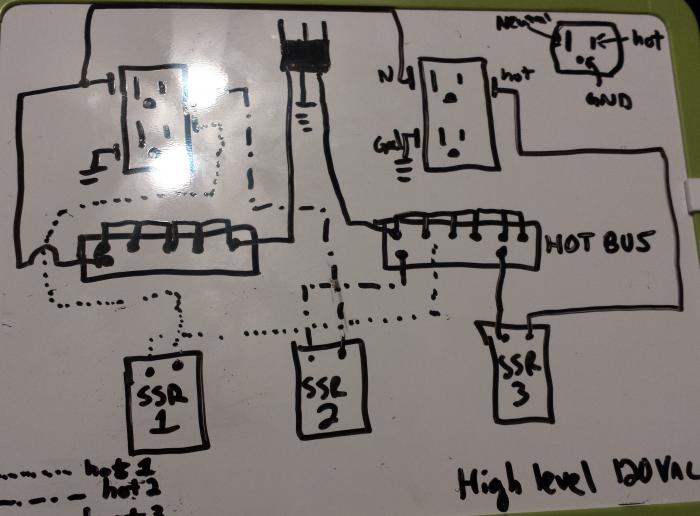jbrewkeggin
Well-Known Member
Greetings,
I wanted to share my Arduino based Mashing controller that I've been working on. The Arduino is controlled by an old laptop running a Python GUI that I made for pump controls and for setting a target temperature. I decided not to use the autotune library after reading some of the comments in this forum. I'm going to set my constants through trial and error like I would with an off the shelf PID controller. I tested the control loop a few times by duct taping my temperature probes to a fermentation heat belt. I used DS18b20 temperature sensors and they attach to my controller box via DB9 connectors.
Here's the Arduino code. Ignore the PID settings, since I plan to tweak those as I learn more from my data:
Feel free to critique this or let me know that I need to change something.
Thanks!




I wanted to share my Arduino based Mashing controller that I've been working on. The Arduino is controlled by an old laptop running a Python GUI that I made for pump controls and for setting a target temperature. I decided not to use the autotune library after reading some of the comments in this forum. I'm going to set my constants through trial and error like I would with an off the shelf PID controller. I tested the control loop a few times by duct taping my temperature probes to a fermentation heat belt. I used DS18b20 temperature sensors and they attach to my controller box via DB9 connectors.
Here's the Arduino code. Ignore the PID settings, since I plan to tweak those as I learn more from my data:
Code:
/* jbrewduino */
/* Developed by JBrew */
// This Arduino sketch reads serves 3 purposes:
// 1. Toggle On/Off a HLT recirculation pump
// 2. Toggle On/Off a Mash recirculation + sparge pump
// 3. Read input from DS18B20 "1-Wire" digital temperature sensors
// and control attached heating element based on temperature feed back.
// This will be accomplished via a PID control loop.
// Valid messages are as follows from the Python program:
// "1" means toggle pump 1 off/on
// "2" means toggle pump 2 off/on
// "3" means toggle heating element off/on
// Codes 80 - 212 are reserved for fahrenheit temperatures
//#define DEBUGG
// All inputs are provided by a Python brewing GUI that transmits serial messages.
#include <Time.h>
#include <Wire.h>
#include <PID_v1.h>
#include <OneWire.h> /* for reading 1-wire bytes */
#include <DallasTemperature.h> /* For parsing and printing temp from DS18B20 bytes */
#ifdef HAVE_SD
#include <SD.h>
#endif
// Data wire is plugged into pin 3 on the Arduino
#define ONE_WIRE_BUS 3
// Setup a oneWire instance to communicate with any OneWire devices
OneWire oneWire(ONE_WIRE_BUS);
// Pass our oneWire reference to Dallas Temperature.
DallasTemperature sensors(&oneWire);
#ifdef HAVE_SD
File dataFile;
char filename[40];
#endif
// Assign the addresses of your 1-Wire temp sensors.
DeviceAddress mashTemp = { 0x28, 0x9E, 0xAC, 0x08, 0x04, 0x00, 0x00, 0x2C };
DeviceAddress hltTemp = { 0x28, 0xFB, 0x1E, 0x15, 0x04, 0x00, 0x00, 0x6D };
String inputString = ""; /* input with temperature from Python GUI */
int newTarget = 0;
int first_write = 0;
int temp = 0;
int bytesSent = 0;
const int heatingPin = 6; /* pin in which the heating element is attached - PID output pin */
int tempLoop = 0; /* This is a global run flag for the temperature feedback loop */
/* We need a valid temperature string because we can also receive messages for toggling
* the heating elements and pumps */
int validTemp = 0;
// On the Ethernet Shield, CS is pin 4. Note that even if it's not
// used as the CS pin, the hardware CS pin (10 on most Arduino boards,
// 53 on the Mega) must be left as an output or the SD library
// functions will not work.
#ifdef HAVE_SD
const int chipSelect = 4;
#endif
//PID Constants
int k_prop = 500;
int k_int = 0;
int k_dif = 0;
double Setpoint, Input, Output; /* PID variables */
//Specify the links and initial tuning parameters
PID myPID(&Input, &Output, &Setpoint,k_prop,k_int,k_dif, DIRECT);
int WindowSize = 1000; /* PID adjusts output between 0 and this window size*/
unsigned long windowStartTime;
unsigned long file_start;
//pumps
const int pumpOne = 5;
const int pumpTwo = 7;
int pumpOneOn = 0;
int pumpTwoOn = 0;
void setup(void)
{
pinMode(heatingPin, OUTPUT);
pinMode(pumpOne, OUTPUT);
pinMode(pumpTwo, OUTPUT);
// start serial port
Serial.begin(9600);
while (!Serial) {
; // wait for serial port to connect. Needed for Leonardo only
}
// Start up the library
sensors.begin();
// set the resolution to 10 bit (good enough?)
sensors.setResolution(mashTemp, 10);
sensors.setResolution(hltTemp, 10);
inputString.reserve(30);
//Serial.print("Initializing SD card...");
// make sure that the default chip select pin is set to
// output, even if you don't use it:
pinMode(10, OUTPUT);
// see if the card is present and can be initialized:
#ifdef HAVE_SD
if (!SD.begin(chipSelect)) {
//Serial.println("Card failed, or not present");
// don't do anything more:
return;
}
#endif
//Serial.println("card initialized.");
windowStartTime = millis();
}
/* function that prints temperatures in human readable form */
void printTemperature(DeviceAddress deviceAddress)
{
if(first_write == 0) {
file_start = millis();
first_write = 1;
}
float tempC = sensors.getTempC(deviceAddress);
if (tempC == -127.00) {
Serial.print("Error getting temperature");
} else {
//Serial.print("C: ");
//Serial.print(tempC);
Input = DallasTemperature::toFahrenheit(tempC);
if (deviceAddress == mashTemp){
#ifdef HAVE_SD
dataFile.print("MASH");
#endif
#ifdef DEBUGG
Serial.print("m");
Serial.print(Input);
Serial.print("\n");
#endif
bytesSent = Serial.write("m");
bytesSent += Serial.write(Serial.print(Input, 2));
bytesSent += Serial.write("\n");
}
if (deviceAddress == hltTemp) {
#ifdef HAVE_SD
dataFile.print("HLT");
#endif
#ifdef DEBUGG
Serial.print("h");
Serial.print(Input);
Serial.print("\n");
#endif
bytesSent += Serial.write("h");
bytesSent += Serial.write(Serial.print(Input,2));
bytesSent += Serial.write("\n");
}
#ifdef HAVE_SD
dataFile.print(",");
dataFile.print(Input);
dataFile.print(",");
dataFile.print(millis() - file_start);
dataFile.print(",");
dataFile.println(Output);
#endif
}
}
void temperatureControl(){
sensors.requestTemperatures();
//Serial.print("HLT temperature is: ");
printTemperature(hltTemp);
//Serial.print("Mash temperature is: ");
printTemperature(mashTemp);
myPID.Compute();/* This must be called once per loop to compute the new output*/
/************************************************
* turn the output pin on/off based on pid output
************************************************/
if(millis() - windowStartTime>WindowSize)
{ //time to shift the Relay Window
windowStartTime += WindowSize;
}
if(Output > millis() - windowStartTime) {
#ifdef DEBUGG
Serial.println("turning heating element ON");
#endif
Serial.write("HE1");
Serial.write("\n");
digitalWrite(heatingPin,HIGH);
}
else {
#ifdef DEBUGG
Serial.println("turning heating element OFF");
#endif
Serial.write("HE0");
Serial.write("\n");
digitalWrite(heatingPin,LOW);
//Serial.println("turning heating element off");
}
}
/*Loop that receives input temperature from Python program */
void receiveInput() {
while (Serial.available() > 0) {
/* once we have input we can start temp control loop */
tempLoop = 1;
// get the new byte
char inChar = (char)Serial.read();
// add it to the inputString:
inputString += inChar;
// if the incoming character is a newline, set a flag
// so the main loop can do something about it:
if (inChar == '\n') {
//Serial.println(inputString);
newTarget = inputString.toInt();
if (newTarget > 60 && newTarget < 215) {
#ifdef HAVE_SD
if(dataFile) {
dataFile.close();
}
sprintf(filename, "LOG-%02d%02d.csv", hour(), minute(), second());
//Serial.println(filename);
dataFile = SD.open(filename, FILE_WRITE);
if(dataFile) {
//Serial.println("New file opened successfully!");
dataFile.print("kp = ");
dataFile.print(k_prop);
dataFile.print(", ki = ");
dataFile.print(k_int);
dataFile.print(", kd = ");
dataFile.print(k_dif);
} else {
//Serial.println("Issue opening file...");
}
#endif
validTemp = 1;
Setpoint = newTarget;
#ifdef HAVE_SD
dataFile.print(", SP = ");
dataFile.println(Setpoint);
#endif
//tell the PID to range between 0 and the full window size
myPID.SetOutputLimits(0, WindowSize); /* vary its output within a given range(1 secs here) */
//turn the PID on
myPID.SetMode(AUTOMATIC); /*PID is on, MANUAL for off*/
}
else if (newTarget == 3) {
#ifdef DEBUGG
Serial.println("Received Start/Stop Message!");
#endif
if (validTemp == 1) {
#ifdef HAVE_SD
dataFile.close();
#endif
Serial.write("HE0");
Serial.write("\n");
digitalWrite(heatingPin, LOW);
validTemp = 0;
}
else {
#ifdef HAVE_SD
dataFile = SD.open(filename, FILE_WRITE);
#endif
Serial.write("HE1");
Serial.write("\n");
digitalWrite(heatingPin, HIGH);
validTemp = 1;
}
}
else if (newTarget == 1) {
if (pumpOneOn == 0) {
#ifdef DEBUGG
Serial.println("Turning pump 1 on");
#endif
digitalWrite(pumpOne, HIGH);
pumpOneOn = 1;
}
else {
#ifdef DEBUGG
Serial.println("Turning pump 1 off");
#endif
digitalWrite(pumpOne, LOW);
pumpOneOn = 0;
}
}
else if (newTarget == 2) {
if (pumpTwoOn == 0) {
#ifdef DEBUGG
Serial.println("Turning pump 2 on");
#endif
digitalWrite(pumpTwo, HIGH);
pumpTwoOn = 1;
}
else {
#ifdef DEBUGG
Serial.println("Turning pump 2 off");
#endif
digitalWrite(pumpTwo, LOW);
pumpTwoOn = 0;
}
}
inputString = "";
} /* if (inChar == '\n') */
} /* while (Serial.available() > 0) */
}
void loop(void)
{
receiveInput();
if(tempLoop == 1 && validTemp == 1)
temperatureControl();
}/* void loop */Feel free to critique this or let me know that I need to change something.
Thanks!






























![Craft A Brew - Safale S-04 Dry Yeast - Fermentis - English Ale Dry Yeast - For English and American Ales and Hard Apple Ciders - Ingredients for Home Brewing - Beer Making Supplies - [1 Pack]](https://m.media-amazon.com/images/I/41fVGNh6JfL._SL500_.jpg)
































